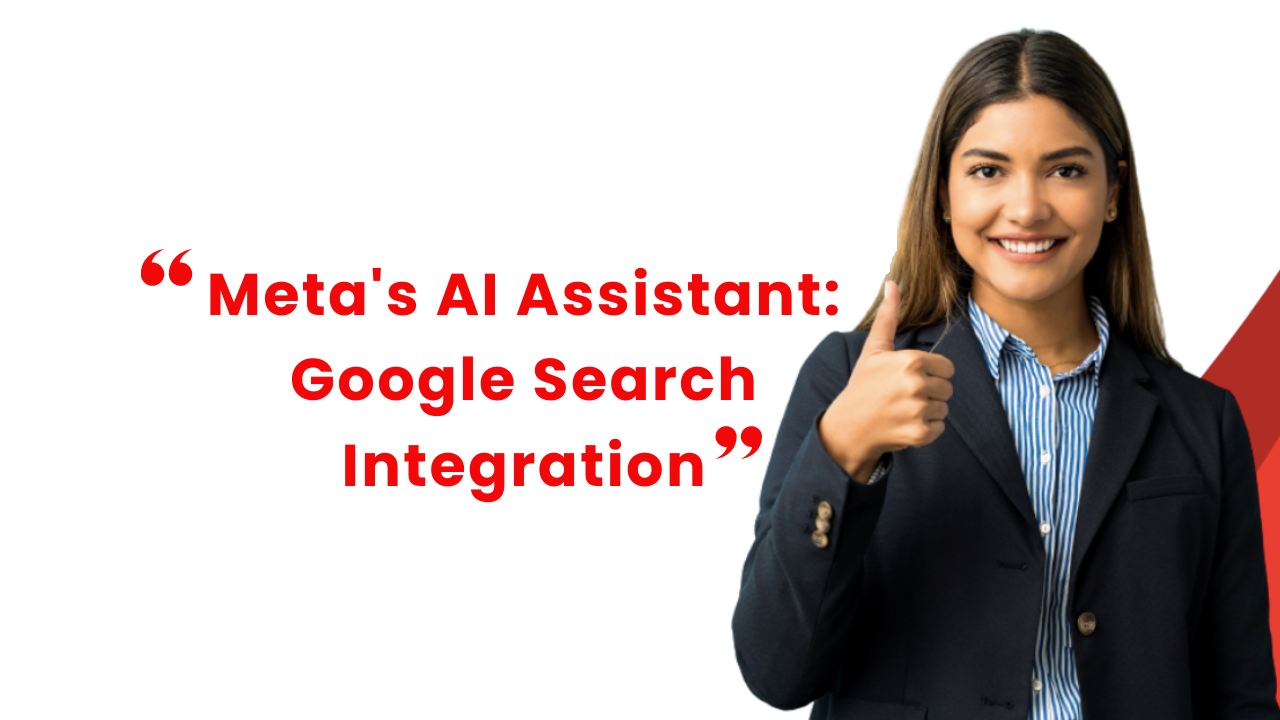


In the rapidly evolving landscape of digital assistants, Meta’s AI Assistant emerges as a pivotal player, poised to redefine the way users interact with Google Search. This sophisticated AI tool represents a convergence of advanced technologies, seamlessly integrating into the fabric of everyday search experiences. By harnessing the power of artificial intelligence, Meta’s assistant enhances the functionality of Google Search, offering users a more intuitive, personalized, and efficient means of accessing information.
Meta’s AI Assistant leverages cutting-edge natural language processing (NLP) algorithms to decipher user queries with unparalleled accuracy and context sensitivity. This capability enables the assistant to understand not just what users are asking, but also the intent behind their queries, delivering tailored search results and recommendations. Whether through voice commands or text inputs, users benefit from a fluid interaction that adapts to their preferences and browsing habits.
Beyond enhancing search capabilities, Meta’s AI Assistant enriches user experiences by providing real-time updates, personalized notifications, and predictive suggestions. It empowers users to navigate a vast sea of information effortlessly, ensuring that relevant content is delivered promptly and efficiently. Moreover, its integration across Meta’s ecosystem and third-party platforms ensures a cohesive user experience across devices, from smartphones to smart speakers.
As we delve deeper into the functionalities, benefits, and future potentials of Meta’s AI Assistant in Google Search integration, it becomes clear that this technology heralds a new era of intelligent digital assistance. Join us as we explore the transformative impact of Meta’s AI Assistant and its implications for the future of search engine interaction and user engagement.
Understanding Meta’s AI Assistant: A Comprehensive Overview
Meta’s AI Assistant represents a significant evolution in digital assistance, particularly within the realm of search engines. This advanced tool integrates seamlessly with Google Search, enhancing user interaction and search capabilities in several key ways:
- Natural Language Processing (NLP) Capabilities: Meta’s AI Assistant leverages sophisticated NLP algorithms to understand and respond to user queries more accurately. It interprets context and intent, making interactions more intuitive.
- Personalized Recommendations: By analyzing user behavior and preferences, the assistant offers personalized search results and recommendations. This enhances user satisfaction by delivering more relevant content.
- Voice Command Integration: Users can interact with Meta’s AI Assistant through voice commands, facilitating hands-free search experiences. This feature is particularly beneficial for accessibility and convenience.
- Real-Time Updates and Notifications: The assistant provides real-time updates on relevant topics, news, and events based on user interests. This keeps users informed without actively searching for updates.
- Cross-Platform Integration: It seamlessly integrates across Meta’s ecosystem and other platforms, ensuring consistent user experience and accessibility across devices.
- Privacy and Security Features: Meta prioritizes user privacy, implementing robust security measures to protect user data and interactions with the AI assistant.
In essence, Meta’s AI Assistant revolutionizes how users interact with search engines, offering a more personalized, intuitive, and secure experience.
How Meta’s AI Assistant Enhances Google Search Capabilities
Meta’s AI Assistant significantly augments Google Search capabilities by incorporating advanced AI technologies that enhance:
- Contextual Understanding: Meta’s AI Assistant interprets user queries with greater context sensitivity, delivering more precise search results.
- Multimodal Search: It supports both text-based queries and voice commands, accommodating diverse user preferences and accessibility needs.
- Predictive Search: Leveraging machine learning, it predicts user intent and provides suggestions before users complete their queries, streamlining the search process.
- Visual Search Integration: Users can initiate searches based on images or visual cues, expanding the scope of search beyond traditional text queries.
- Real-Time Data Analysis: Meta’s AI Assistant processes and presents real-time data from various sources, offering up-to-date information on dynamic topics and trends.
- Enhanced User Engagement: By personalizing search results and recommendations, it enhances user engagement and satisfaction, leading to longer session durations and increased interaction rates.
In summary, Meta’s AI Assistant elevates Google Search by integrating advanced AI capabilities that enrich user experiences and optimize information retrieval.
Key Features of Meta’s AI Assistant in Google Search Integration
Meta’s AI Assistant introduces several pivotal features within Google Search, enhancing functionality and user experience through:
- Voice-Activated Search: Users can initiate searches and perform actions using voice commands, facilitating hands-free interaction and accessibility.
- Personalized Recommendations: Based on user behavior and preferences, the assistant tailors search results and content recommendations, improving relevance and user satisfaction.
- AI-Powered Predictive Suggestions: It anticipates user intent and provides predictive suggestions, enhancing search efficiency and user convenience.
- Cross-Platform Integration: Seamless integration across Meta’s ecosystem and third-party platforms ensures consistent user experience across devices and applications.
- Real-Time Updates: Users receive timely updates on topics of interest, including news, events, and personalized notifications, keeping them informed without active searching.
- Privacy and Security: Meta prioritizes user privacy, implementing robust security measures to protect data and interactions with the AI assistant.
Meta’s AI Assistant in Google Search integration represents a paradigm shift in how users interact with search engines, offering enhanced personalization, accessibility, and functionality.
Benefits of Using Meta’s AI Assistant with Google Search
The integration of Meta’s AI Assistant with Google Search brings numerous benefits to users, including:
- Enhanced User Experience: Personalized search results and recommendations improve user satisfaction and engagement.
- Efficient Information Retrieval: AI-powered predictive suggestions and real-time updates streamline the search process, saving time and effort.
- Accessibility: Voice-activated search capabilities cater to diverse user needs, promoting inclusivity and accessibility.
- Cross-Platform Consistency: Seamless integration across platforms ensures a consistent user experience across devices and applications.
- Real-Time Updates and Notifications: Users stay informed with timely updates on topics of interest, enhancing knowledge and awareness.
- Privacy and Security: Robust security measures protect user data and interactions with the AI assistant, prioritizing user privacy.
By leveraging Meta’s AI Assistant within Google Search, users can enjoy a more personalized, efficient, and secure search experience.
User Experience: Navigating Google Search with Meta’s AI
Navigating Google Search with Meta’s AI Assistant transforms the user experience through:
- Intuitive Interface: The assistant’s natural language processing capabilities enable more conversational interactions, making search queries more intuitive.
- Personalization: Tailored search results and recommendations based on user preferences enhance relevance and user satisfaction.
- Voice Command Integration: Voice-activated search and command functionalities provide hands-free interaction, improving accessibility and convenience.
- Predictive Search: AI-powered predictive suggestions anticipate user intent, offering relevant search options before queries are fully articulated.
- Real-Time Updates: Users receive timely updates on topics of interest, including news, events, and personalized notifications, enhancing relevance and engagement.
- Privacy and Security: Strong privacy measures safeguard user data and interactions with the AI assistant, ensuring a secure browsing experience.
In essence, navigating Google Search with Meta’s AI Assistant enriches user interaction, offering a seamless, personalized, and secure search experience.
The Future of AI Assistants: Meta and Google’s Collaborative Innovations
The future of AI assistants, particularly with Meta and Google’s collaborative innovations, promises:
- Enhanced AI Capabilities: Continued advancements in AI technology will enable assistants to better understand and respond to user queries with increased accuracy and context sensitivity.
- Integrated Ecosystems: Further integration across Meta’s ecosystem and Google platforms will offer users a unified experience across devices and applications.
- Augmented Reality (AR) Integration: Exploration of AR capabilities may enable AI assistants to provide visual and interactive search results, enhancing user engagement.
- Voice and Gesture Commands: Evolution towards more intuitive interaction methods, including voice and gesture commands, will enhance accessibility and user convenience.
- Ethical AI Practices: Emphasis on ethical AI practices will ensure responsible development and deployment of AI assistants, prioritizing user privacy and data security.
- Innovation in User Experience: Continuous innovation in UX design will focus on delivering seamless, personalized, and anticipatory experiences for users.
Meta and Google’s collaborative innovations in AI assistants signify a transformative shift towards more intelligent, integrated, and user-centric digital experiences.
These points aim to provide a comprehensive understanding of Meta’s AI Assistant and its integration with Google Search, highlighting its benefits, features, and future implications.
Frequently Asked Questions (FAQs)
Q1. How does Meta’s AI Assistant differ from traditional search engines like Google?
Answer: Meta’s AI Assistant differs significantly from traditional search engines like Google due to its advanced artificial intelligence capabilities. Here’s how:
- Natural Language Processing (NLP): Meta’s AI Assistant employs sophisticated NLP algorithms to understand queries in context, enabling more conversational and intuitive interactions compared to keyword-based searches.
- Personalization: It offers highly personalized search results and recommendations based on user behavior and preferences, enhancing relevance and user satisfaction.
- Voice Command Integration: Users can interact with the assistant using voice commands, facilitating hands-free search experiences that traditional search engines may not fully support.
- Real-Time Updates: It provides real-time updates on relevant topics and events, keeping users informed without actively searching.
- Cross-Platform Integration: Seamless integration across Meta’s ecosystem and other platforms ensures a consistent user experience across devices, enhancing accessibility and usability.
Q2. How does Meta’s AI Assistant impact privacy and data security?
Answer:
Meta prioritizes user privacy and data security with its AI Assistant in several ways:
- Data Encryption: User data is encrypted to prevent unauthorized access and ensure secure interactions.
- Opt-In Controls: Users have control over their data sharing preferences and can opt-in or opt-out of personalized features.
- Anonymization: Where applicable, user data is anonymized to protect identities and ensure anonymity in aggregated analytics.
- Transparency: Meta provides clear information on how user data is used and stored, maintaining transparency in data handling practices.
- Compliance: The AI Assistant adheres to relevant data protection regulations and industry standards to safeguard user privacy effectively.
Q3. Can Meta’s AI Assistant be integrated with other applications and services?
Answer: Yes, Meta’s AI Assistant is designed for seamless integration with various applications and services:
- API Accessibility: Developers can access APIs to integrate Meta’s AI Assistant functionalities into third-party applications and services.
- Customization: Integration options allow businesses to tailor the assistant’s capabilities to suit specific operational needs and user requirements.
- Ecosystem Compatibility: It works across Meta’s ecosystem and can potentially integrate with other platforms through APIs and partnerships.
- Scalability: Integration capabilities are scalable, accommodating diverse use cases from simple task automation to complex enterprise solutions.
- Interoperability: It supports interoperability with different platforms, enhancing usability and functionality across diverse digital environments.
Q4. What are the potential applications of Meta’s AI Assistant beyond search?
Meta’s AI Assistant extends beyond search functionalities, offering diverse applications:
- Virtual Assistance: It can act as a virtual assistant for scheduling, reminders, and daily tasks, enhancing productivity and organization.
- Customer Service: Businesses can deploy the assistant for customer service interactions, improving response times and service quality.
- Content Recommendations: Media and entertainment platforms can use the assistant to recommend personalized content based on user preferences and viewing habits.
- Smart Home Integration: It integrates with smart home devices, enabling voice-controlled automation and management of connected devices.
- Healthcare: In healthcare, the assistant can support telemedicine consultations, patient monitoring, and health information retrieval with enhanced privacy and security measures.
Q5. How does Meta ensure ethical AI practices with its AI Assistant?
Answer: Meta upholds ethical AI practices with its AI Assistant through:
- Bias Mitigation: Algorithms are designed and tested to minimize biases in data processing and decision-making.
- Ethical Guidelines: Clear ethical guidelines govern the development and deployment of AI technologies, ensuring responsible use.
- User Empowerment: Users are informed about AI assistant functionalities, data usage policies, and their rights to control data sharing.
- Continuous Evaluation: Ongoing evaluation and monitoring of AI systems ensure compliance with ethical standards and regulatory requirements.
- Stakeholder Engagement: Meta engages with stakeholders, including users, regulators, and experts, to address ethical concerns and improve AI governance practices.
Conclusion
Meta’s AI Assistant represents a transformative advancement in digital assistance, particularly in its integration with Google Search. As evidenced by its advanced AI capabilities, seamless integration across platforms, and commitment to user privacy, Meta’s assistant redefines the way users interact with search engines and digital services.
From enhancing search accuracy and personalization to facilitating hands-free interactions through voice commands, Meta’s AI Assistant offers a comprehensive solution that adapts to user needs and preferences. Its impact extends beyond traditional search functionalities, enabling applications in virtual assistance, customer service, smart home automation, healthcare, and more.
Moreover, Meta’s dedication to ethical AI practices ensures that the assistant operates responsibly, mitigating biases, respecting user privacy, and adhering to regulatory standards. This commitment underscores Meta’s efforts to innovate ethically and sustainably in the realm of artificial intelligence.
In conclusion, Meta’s AI Assistant in Google Search integration heralds a new era of intelligent digital assistance, promising enhanced user experiences, greater efficiency, and a more connected digital ecosystem.





